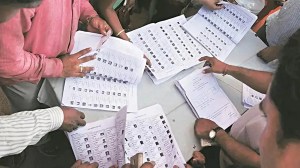Newspapers to stay as long as people buy fish!
NEW DELHI, DECEMBER 8: House-training your dog? Wrapping your freshly-bought fish? Starting a fire in the fireplace? If you plan on doing ...

NEW DELHI, DECEMBER 8: House-training your dog? Wrapping your freshly-bought fish? Starting a fire in the fireplace? If you plan on doing all these things as per tradition in the coming millennium, the future of newspaper is secure, according to Time magazine’s Asia Editor.
Donald Morrison was delivering the first Press Club of India Lecture on Journalism in the New Millennium. Editors of Outlook and The Times of India, Vinod Mehta and Dileep Padgaonkar, and the Beeb’s Asia Pacific Editor Larry Jagan were on the panel that was clubbed with the lecture.
Sweeping aside the perceived threat from the Internet, Morrison said that the print news medium was on the threshold of its golden age. Morrison listed portability (can’t carry TV/PC into the bath), self-sustainability (requires no batteries, won’t crash like your PC) and multifunctionality (to wrap fish and dog poo in) as a newspaper’s USPs.
“When TV came, Hollywood and radio were terrified. But all three prevailed afteradjustments. We are quaking too. And for survival, newspapers and newsmagazines have only one option if they want to be information providers: Get into the internet business.”
In the US, the Time Asia editor said, newspapers are developing their internet sites into portals. Boston Globe does classifieds, a where-to-go-and-what-to-do guide, bridal registry. Spying some blank expressions in the audience, he elaborated: “You can select the pattern for the silver, the china, the crystal. And people like Laloo Prasad Yadav, who have guest-lists touching 10,000, can avoid the perils of presents getting repeated.”
And he doesn’t think that internet editions mean fewer people will buy newspapers. “Cannibalisation hasn’t happened with Time in spite of a host of sites. Moreover, one can place all the facts to a story online, which a newspaper or a newsmagazine has to edit because of space constraints. The killer combination for the next millennium is print and Web, the `clicks-and-mortar’mantra (a modification of bricks and mortar).” Technology no longer gives you an advantage, said the big boss of Time Asia who is based in Hong Kong. “Ebay was the online auction leader for precisely 10 minutes before a dozen competitors caught up. The kid in a garage now has the capacity to give the big guys a whipping. The guarantor/hallmark of success is new ideas which Indians have enough of, even though they might not be so technologically rich.”
And then he spoke the words that Indian newsprint readers so often crib about. “We need to change the outlook of our profession. We are too heavily focussed on the minutae of politics. People are not bothered about what this statesman did or said. As journalists, we eat, sleep, read politics. We need to find out what our readers want. And that is more on health and environment, and how to manage their lives.”
“We do not have the mandate to be boring,” he concluded.
“I don’t even understand the Internet,” began Vinod Mehta. He warned journalistsin India not to jump the gun. Wait and watch before pressing the panic buttons. “Or there will be much blood on the streets like it happened after the satellite TV shakedown.”
Journalism in the new millennium, according to Mehta, needs to recover the lost editorial ground to managers.
`The most battered punching bag’ Dileep Padgaonkar said no. “There should not be any divide between the editorial and the management. The bottomline is the reader — the upmarket society, the youth — who is vastly interested in IT.”
The conservative-staid-accurate-precise news and current affairs editor of BBC, Larry Jagan, reaffirmed Morrison’s views: “The Internet is not a challenge but an opportunity for journalists. One media is not going to be replacing the other. People are going to be selective about what they read or view.”



- 01
- 02
- 03
- 04
- 05




























